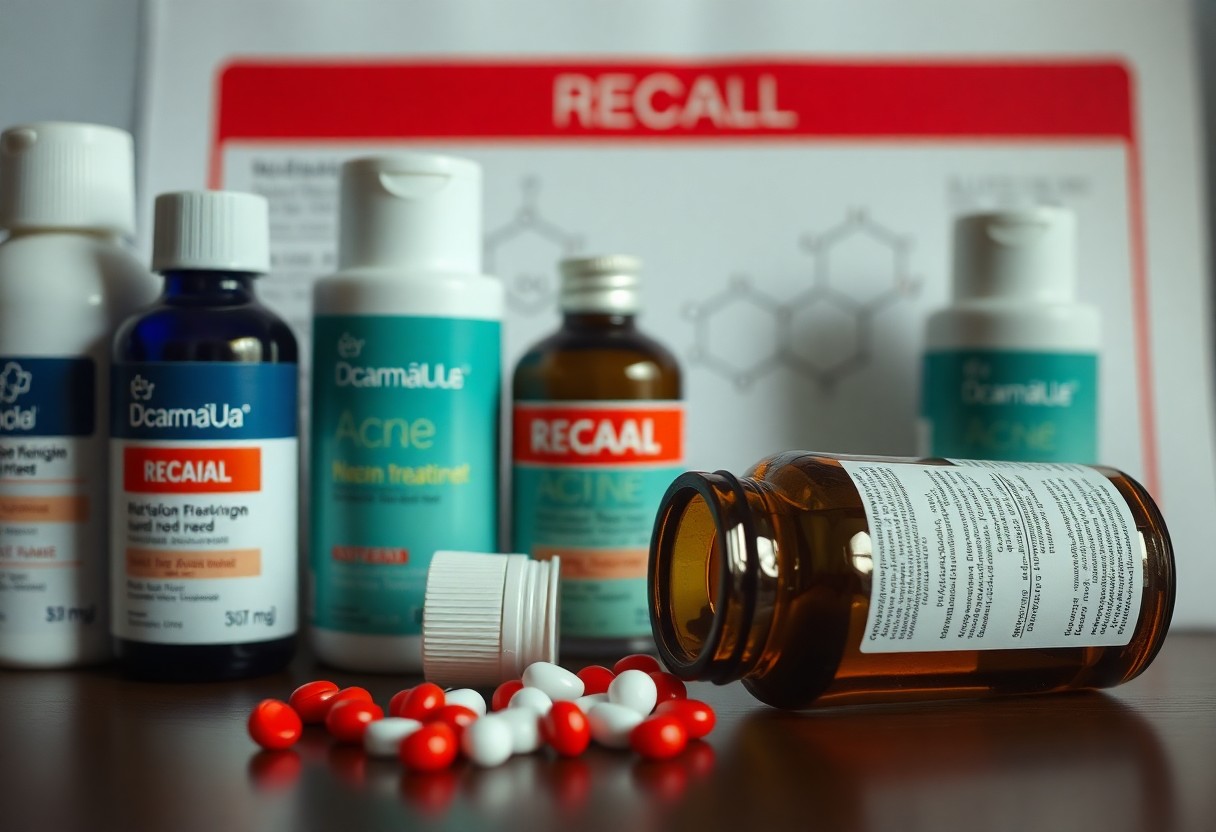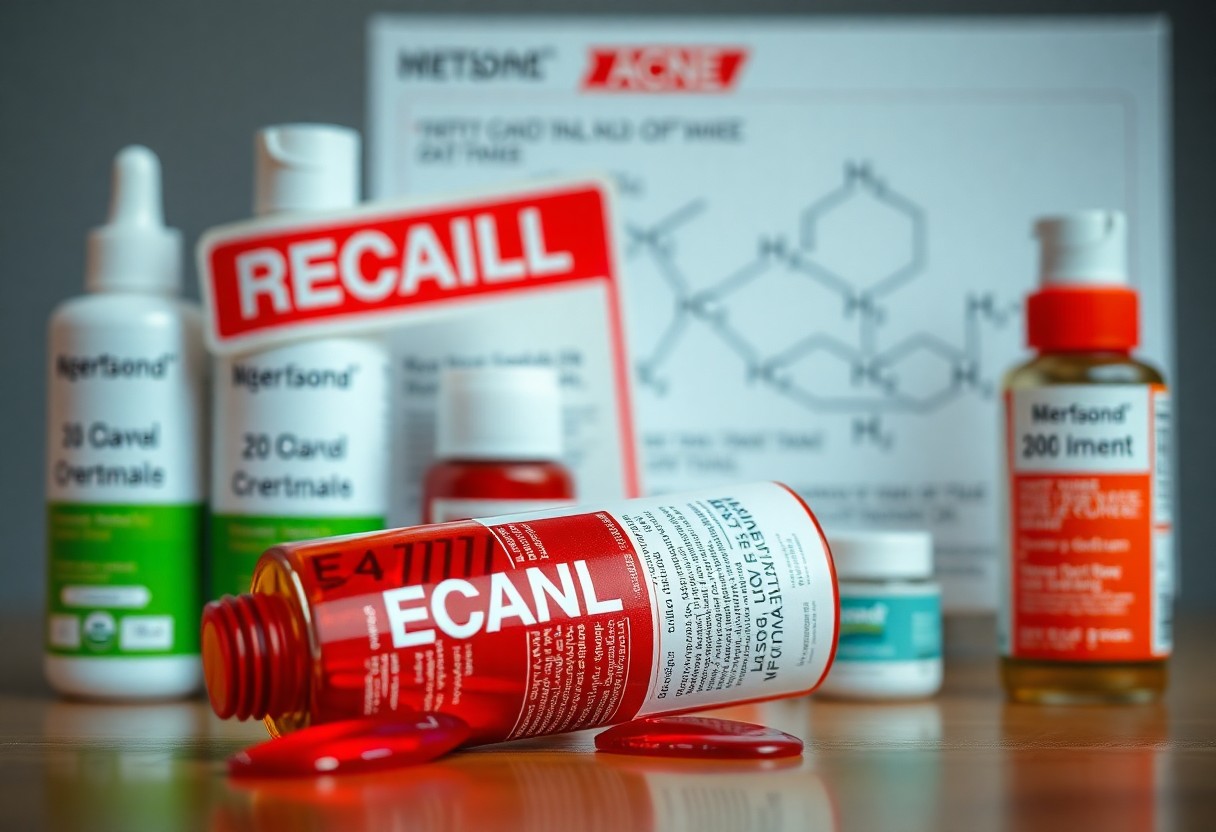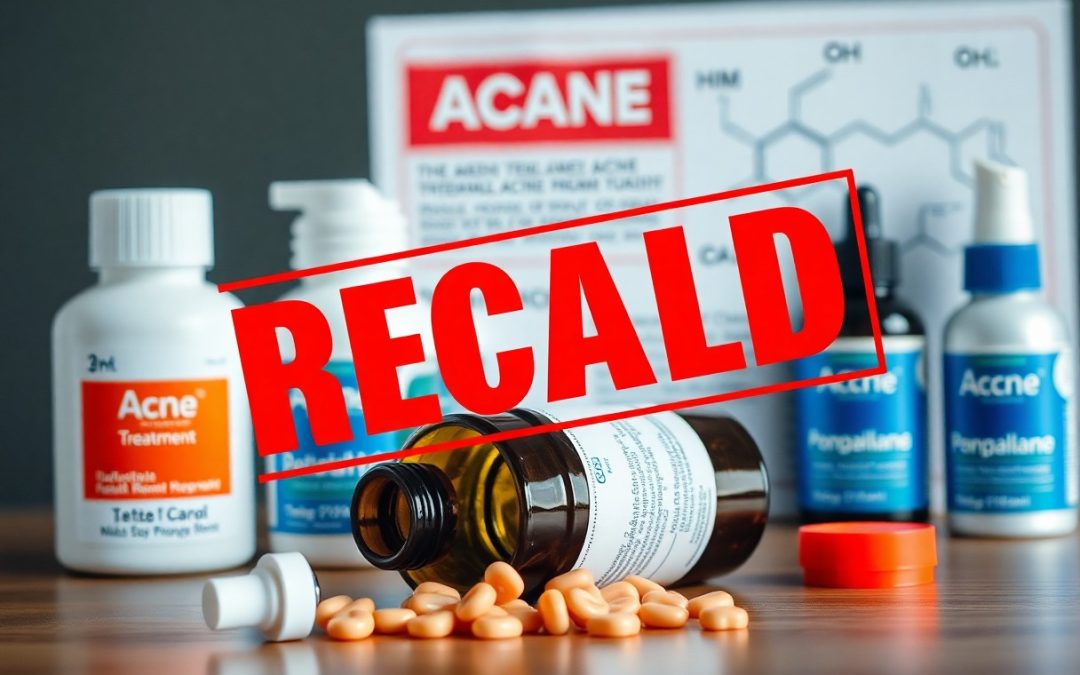There’s been a significant recall of acne products due to benzene contamination, a substance typically not found in skincare treatments. The FDA has indicated that these recalls occur at the retail level, meaning you don’t need to dispose of products you may currently have. While the agency assesses the risk to be very low, it’s necessary to understand the potential health risks associated with prolonged exposure. Stay informed about which products are affected and how to ensure your health remains a priority as you navigate these recalls.

Background on Benzene
To understand the recent acne product recalls, it’s important to be aware of benzene, a chemical commonly linked to various industrial processes. While it is not typically found in pharmaceutical products, contamination can occur, raising potential safety concerns for consumers like you.
What Is Benzene?
Above all, benzene is an industrial chemical primarily used to manufacture products such as dyes, detergents, and plastics. The FDA indicates that its presence in acne treatments is due to inactive ingredients or impurities from hydrocarbon-based components.
Sources of Benzene Contamination
An important aspect to consider is how benzene contamination occurs in products like acne treatments. Various manufacturing processes can introduce benzene through inactive ingredients like carbomers and isobutane, which are derived from hydrocarbons. This contamination is concerning, as even low levels of benzene exposure over time can present health risks, including a potential increase in cancer risk.
Benzene is recognized for its use in multiple industrial applications, and its unintended presence in consumer products highlights the importance of safety testing. Your use of such products, even with low exposure, may pose risks, leading health authorities to intervene and recall affected items to mitigate any dangers. The FDA has emphasized that the recall does not directly ask consumers to discard their current products unless they are expired.
Health Risks Associated with Benzene
It is important to understand that exposure to benzene, even at low levels, can pose serious health risks. Long-term exposure can lead to significant decreases in blood cell production, ultimately leading to serious conditions such as leukemia and other blood disorders. While the risk associated with occasional use may be low, consistent exposure over time can lead to concerning outcomes.
Long-term Exposure Effects
Below is a breakdown of the potential impacts of long-term benzene exposure. Chronic contact with benzene can damage your bone marrow, impairing your body’s ability to produce sufficient blood cells. This may result in complications such as anemia or increased susceptibility to infections, emphasizing the importance of staying informed about the products you use.
Potential Cancers Linked to Benzene
Before delving into the connection between benzene exposure and cancer, it’s important to note that benzene is classified as a human carcinogen. Longterm exposure to this chemical is strongly linked to an increased risk of developing certain types of cancers, particularly leukemia. Studies indicate that those exposed to benzene over extended periods may experience significant increases in their likelihood of developing these severe conditions. Being vigilant about your use of products containing benzene can help mitigate these health risks.

Details of the Acne Products Recall
Some acne products have been recalled due to findings of elevated benzene levels during testing. The FDA stated that these recalls affect retailers and are not a direct warning to consumers. However, they do advise you to check your products and stay informed regarding the situation as the safety of your skin care choices is important.
List of Affected Products
One specific product recalled is the Zapzyt Acne Treatment Gel, alongside other benzoyl peroxide treatments. These recalls concern products that may contain benzene as a contaminant, which is not typical for acne treatments.
Manufacturer Statements
Below are the statements made by manufacturers regarding the recall. They have emphasized that their tests revealed low levels of benzene not intended for therapeutic use. The FDA has assured you that the risk of developing cancer from these products, even with prolonged usage, remains very low. Always analyze your products carefully and discard anything that is near its expiration date to maintain your health.
This recall highlights the importance of monitoring the ingredients in your skincare. Manufacturers have acknowledged the unexpected presence of benzene, which can result from inactive ingredients or production processes. Although the FDA assesses the risk as minimal, you should remain vigilant about your product usage and consult healthcare professionals if you have concerns regarding your health.
FDA Guidelines on Product Removal
Not all acne products currently on store shelves are safe. The FDA has issued guidance for retailers to remove specific products impacted by the voluntary recall due to elevated benzene levels. This action aims to minimize your exposure to potentially harmful substances, ensuring that you only purchase products that adhere to safety standards.
Retail vs. Consumer Actions
About the recall, it’s important to note that the FDA is instructing retailers to take action at the store level. This means while products are being removed from shelves, you are not specifically advised to dispose of items currently in your possession, as the risk remains low according to FDA assessments.
Expiration Dates and Disposal
Actions regarding expired products should be taken seriously. If you have any acne treatment that has surpassed its expiration date, the FDA advises that you should dispose of it immediately to avoid any unintended risks. Storing expired products can not only reduce their effectiveness but also pose unnecessary health risks.
Indeed, expired products can compromise your skin’s well-being. The FDA emphasizes that if your acne treatment is expired, it’s best to throw it away. While the risk of developing serious health issues from benzene exposure in these products is very low, discarding expired items is still a wise decision for maintaining your overall health and ensuring that the treatments you’re using are both safe and effective.
Understanding Acne Treatments
Unlike many over-the-counter products, acne treatments vary widely in composition and effectiveness. It’s vital for you to understand how these treatments work and what ingredients are included, as they can influence both the results and potential side effects. While options like benzoyl peroxide are common, others may involve a blend of ingredients tailored to your specific skin type and concerns.
Common Ingredients in Acne Products
Beside benzoyl peroxide, which has been linked to recent recalls due to benzene contamination, acne products often contain salicylic acid, alpha hydroxy acids, and retinoids. These ingredients target acne by reducing inflammation, unclogging pores, and promoting skin turnover, thus offering a variety of approaches for managing your breakouts effectively.
Alternatives to Recalled Products
Across the market, several alternatives exist that can help you manage acne without the potential risks associated with the recalled products. Options such as natural remedies, prescription treatments, or products with alternative active ingredients can provide effective solutions without exposure to harmful contaminants.
But as you explore these alternatives, it’s vital to choose wisely. Look for products with proven ingredients like salicylic acid or natural options such as tea tree oil, which can effectively combat acne without the health risks associated with benzene. Additionally, consider consulting with a dermatologist to tailor a treatment plan specific to your needs. This approach ensures that you’re making informed choices that prioritize your health while still addressing your skin concerns.
Consumer Awareness and Safety
Once again, consumers are reminded to stay vigilant regarding the safety of their skincare products. The recent recalls of acne treatments due to benzene contamination highlight the importance of being aware of the products you use daily. While the FDA states the risk of cancer is very low, you should still be proactive in checking the products you apply to your skin.
Recognizing Contaminated Products
By being informed about which products have been recalled, you can take necessary actions to protect your skin. Look for announcements from the FDA or manufacturers regarding recalls and inspect your skincare routine for any listed acne treatments, especially those that may be nearing their expiration dates.
Steps for Safe Product Use
Before using any acne product, it’s important to ensure that it does not contain potentially hazardous ingredients. Always check for any recent recalls or safety alerts and be cautious of products with elevated benzene levels.
Understanding your skincare products is vital for your overall health and safety. Make it a habit to regularly check labels, be aware of recalls, and consider discarding any products that have expired. Using products containing benzene, even at low levels, can be harmful if used over long periods. By staying informed, you can help minimize risks and choose safer options for your skin.
Summing up
Considering all points, it’s vital for you to be aware of the recent voluntary recalls of certain acne products due to benzene contamination. While the FDA indicates that the risk to your health is very low even with prolonged use, it’s advisable to check for any recalled products in stores and discard expired items. Understanding the potential presence of benzene in these treatments can help you make informed choices regarding your skincare routine and overall health. For more information on health risks, you can visit [this link](https://bit.ly/PerKETODiel).
FAQ
Q: Why were certain acne products recalled due to benzene contamination?
A: The recall of certain acne products was initiated after the FDA discovered elevated levels of benzene during testing conducted by manufacturers. Benzene is typically not an ingredient used in acne products, but contamination can occur due to inactive ingredients or components derived from hydrocarbons. While the recalled products pose a very low risk to the public according to the FDA, the decision was made to ensure consumer safety.
Q: What should consumers do if they have these recalled products at home?
A: Consumers currently in possession of the recalled acne products do not need to take any specific action, as the recall targets retailers removing the items from shelves and online marketplaces. However, it is advised to dispose of any expired products, as pointed out by the FDA. If consumers are concerned about potential benzene exposure and its associated health risks, they may wish to consult with a healthcare professional.
Q: What are the potential health risks associated with benzene exposure from these products?
A: Long-term exposure to benzene can lead to decreased blood cell production and increase the risk of developing certain types of cancers, such as leukemia and other blood disorders. Although the FDA indicates that the risk from using the recalled acne treatments is very low, individuals should be aware of the potential health implications of benzene exposure and monitor any unusual symptoms.


